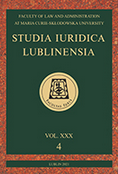Global Constitutionalism and Legal Fragmentation: The Populist Backslide in Central and Eastern Europe
Global Constitutionalism and Legal Fragmentation: The Populist Backslide in Central and Eastern Europe
Author(s): Andrei N. MedushevskiySubject(s): Constitutional Law, Government/Political systems, Politics and law, Comparative politics, Globalization, Comparative Law
Published by: Wydawnictwo Naukowe Uniwersytetu Marii Curie-Sklodowskiej
Keywords: global constitutionalism; constitutionalisation; fragmentation; sovereignty; legitimacy; conflict-mediation strategy;
Summary/Abstract: Globalisation has provoked a deep transformation in international law, political affairs and governance with contradictory consequences. It has stimulated the cosmopolitan project of global constitutionalism, transnational integration and the unification of democratic standards. However, it also resulted in the fragmentation of international affairs, the deterioration of constitutional democracy and a feeling of a growing shortage in democracy on national and international levels of governance. Trying to balance the impact of these two opposing trends, the author analyses the positive and negative effects of globalisation on constitutional development regarding such issues as transnational constitutionalisation, democracy and national sovereignty, the changing place of multilayer constitutionalism, the international separation of powers, and the system of global governance in the establishment of transnational constitutional democratic legitimacy. From this point of view, the populist backslide in Central and Eastern Europe (CEE) looks dangerous and unforeseen, but it is a systemic and potentially predictable reaction of global regions on the uneven character of integration, the lack of democratic legitimacy and a new answer to the contortions and dysfunctions of global governance. An adequate response to these challenges could be found in a new concept of constitutional integration based on ongoing dialogue between the transnational and national actors of legal globalisation. This dialogue is possible by using a conflict-mediation strategy, elaborated by international experts, especially, for the deliberation of complex and protracted conflicts, which have no clear practical solutions in the short to medium term.
Journal: Studia Iuridica Lublinensia
- Issue Year: 30/2021
- Issue No: 4
- Page Range: 393-440
- Page Count: 48
- Language: English

